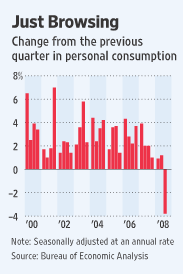A recent Forbes article indicates that a whopping third of U.S. women are planning on making NO clothing purchases in 2009! That is an incredibly high number, in my opinion, and speaks volumes about the current state of our economy. Apparently, in a 'normal' year, only 4% of women say they won't purchase any clothing. In fact, consumption in general seems to be waning, as the graph below from the Wall Street Journal indicates. Partly as a result of the sudden increase in women who will wear what's in their closets, many retailers are either in dire straits--and will probably close their doors completely--or are in serious financial jeopardy. I was shocked to see some of the well-known brands that may be shutting some or all of their stores in the coming year:
Partly as a result of the sudden increase in women who will wear what's in their closets, many retailers are either in dire straits--and will probably close their doors completely--or are in serious financial jeopardy. I was shocked to see some of the well-known brands that may be shutting some or all of their stores in the coming year:
- Eddie Bauer
- Ann Taylor (a personal favorite)
- Sears/Kmart
- Lane Bryant
- Pacific Sun
- Timberland
Well, I decided to do a little unscientific web research on the topic of frugality, saving money, and helping (or hurting) the economy. Here's what I found:
Jim Ludwick of the Business Monthly has this to say:
"I won't take you back to school for economics class other than to remind you that when you save you can help banks, companies and even the government save money, too, by putting your dollars to work at less cost. That means more profits for businesses and their owners (read: shareholders), and it lowers the cost that the government must pay to borrow (read: lower interest rates)."Scott Malcomson writes on the Huffington Post:
"The theory is that, in the near term, the American economy needs stimulus, and a critical part of that stimulus should come from consumers. Otherwise the current Mexican standoff - companies cutting back and shedding workers, banks not lending, consumers not spending - will continue.Meanwhile Steve Hamm, over at Business Week writes about the 'new frugality' this way:It makes sense, up to a point. But it isn't as though Americans aren't spending at all. A savings rate of 10 percent will still keep us a bit behind the French and Germans (who don't have our worries about health care and retirement savings), and far behind the Chinese, whose levels are somewhere around 20 or 30 percent (and who have much worse worries than we do about health care and retirement). Besides, the money is not being put under mattresses. It is going into bank accounts and other highly conservative investments. It is available to be lent."
"Menzie D. Chinn, who teaches economics at the University of Wisconsin, figures consumers won't be in a position to spend freely for five years.Which brings us to what John Maynard Keynes called the paradox of thrift. What's good for the individual, argued the famous economist, can ignite or deepen a recession. But that won't deter the newly thrifty. "I can't help the economy," says Kim Schultz, a resident of hard-hit Avoca, Mich., who with her husband, Jon, owes $40,000 in credit-card debt. "I've got to help myself." On the other hand, this newfound austerity could—emphasis on could—rewire Americans as savers rather than spenders. And that would help put the economy on a sounder footing over the long haul."
It seems that Keynesian economists would likely blame the slowing economy on frugal Americans like me---if I don't spend, then our consumer-driven economy will topple and fall. But isn't it better for Americans to SAVE, rather than overspend? Isn't one of the reasons we're in this predicament because lenders gave out too much easy credit to people (like myself) without the ability to pay it back?
Although I "get" the argument that I must spend to help my country's economy, I don't BUY it. A healthy economy, in my humble opinion, is not one that is driven by short term spending by people who are living above their means. Instead, a healthy economy is one that is based on long-term investment in the things we can afford, whether at the individual level with a reliable car (paid for with cash) or at the government level with investment in sustainable industries and infrastructure.
I choose a healthy economy. I choose frugality.






2 comments:
I like your pun about not "buying" it! I am not going to change my frugal living either. There are enough people out there to do the buying to make up for me.
I totally agree. To have people spend when they don't have the cash to do so (or when to do so will deplete one's savings) is crazy. That is not a sustainable economy. If we recover with that method, then we will only return to the current state of the economy at some point.
Maybe it will take longer for a turn around, but if individuals save more and consciously consume (purchase) based on needs and wants that they can afford than the world will be better off.
Being frugal does not mean being a money hoarder. It just means being wise and conscious about how one chooses to spend the money that they do have so that one can live below their means in order for a more secure future.
Post a Comment